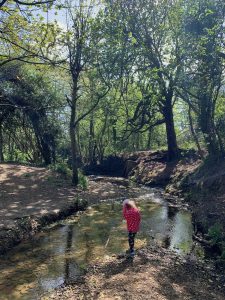Before I launch into part 2 of this series, a quick reminder . . .Give Yourself Lots of Grace! – As I’m hearing various mothers speak about their recent (challenging!) experiences as new homeschoolers, let me just begin by re-stating a point that’s very central in my heart! If you are new to homeschooling, due to Covid-19 or your own choice, then what you need to remember right now is to give yourself a break!! Have compassion on yourself – you are in a difficult place of transition. I promise things will get easier over time, but right now, remember to take lots of deep breaths and be very patient with yourself and your sweet children. Homeschooling is a new way of life, that I believe you’ll come to love. But it will take time to find your new rhythms and figure out what works for you and your children. It’s a journey for sure, but one that can be full of joy and blessing – so try to relax and enjoy the ride! (For more encouragement to be patient with yourself, see my post: New to Homeschooling? – Part One .)
What is the purpose of education? – Fourteen years ago, when I was a brand new homeschooling mum, I was given a piece of incredible advice. Simple but profound. I have failed many times at implementing it (as I so often fail in so many areas!) but I have hung onto it tightly and done my best to let it shape my homeschooling. What were those words of wisdom that I was given: Make it your number one goal to see to it that your children LOVE to LEARN.
Looking back on my own education, it’s sad but true that much of what I learned has been forgotten (calculus or physics or grammar anyone??). In light of this, I would like to suggest a controversial point. The goal of truly excellent education should not merely be to transfer information from the brain of the teacher to the brain of the child. If that is the goal, then most education is quite a pointless exercise! Historians are not certain who authored the following profound quote . . . but here it is: The real aim of education should not be to fill a brain/pail/vessel, but instead to light a fire!
Your children will never remember everything they learn in school. But if deep within them they have gained a permanent appetite to learn, to know, and to discover . . . if their imaginations have been captured by things that truly matter, then they will be very well-equipped for life! So how do we kindle this flame in them? I know that whole books have been written in answer to this question. But let me offer a few of my own thoughts.
How do we kindle the flame? – 2 Simple Suggestions . . . And one thing to avoid
Story! – If you want a very simple, very powerful way to “light the fire” in your children – read, read, read stories to them! Picture books, longer chapter books, fiction, non-fiction, poetry . . . any books! (Of course, be sure to pick engaging, life-giving stories.) Human beings are intrinsically drawn to stories – we live in stories ourselves and look to stories for inspiration and comfort and guidance. My number one recommendation if someone asks me “how” to homeschool, is to spend lots of time reading aloud together. And don’t stop when your children can read for themselves! Research shows that through the simple act of reading aloud, you are accomplishing multiple incredible things all at once. Reading aloud results not only in massive educational benefits, but it stirs up a love for learning and also strengthens family bonds in beautiful ways. Plus it’s just pure fun! How much more enjoyable to read an exciting story about a Danish family hiding Jews from the Nazis (see Lois Lowry’s awesome book Number the Stars) than to wade through a dry textbook explanation about World War II. We have seen reading aloud achieve beautiful things in our home over the past 14+ years of homeschooling and I can’t urge you strongly enough to make this part of your family culture! Reading together builds bonds, it changes lives and it kindles the “love to learn” flame!
NOTE: If you are interested in finding out more on this topic, I highly recommend the wonderful book, The Read Aloud Family, by Sarah MacKenzie. She also has an amazing podcast called the Read-Aloud Revival (available on iTunes) and a brilliant website full of recommended books for all ages and occasions. Soooo worth checking out!
Quote from Sarah Mackenzie: “Books are powerful. Sharing those books together is like jet fuel for our family bonding and our kids’ academic and social and emotional success.”
Time Outdoors – Another very simple but very powerful way to “light the fire” of your children’s love for learning is to take them outside! God’s creation is packed full of things to stir up wonder and awe in your child’s heart – essential ingredients for loving to learn. From the vastness of space to the gorgeous spring blossoms and flowers . . . from teeny tiny bugs to massive lightning bolts. Nature not only delights those with eyes to see, but it inspires us to know, to learn, to discover. When do we as human beings stop learning? When we stop asking questions! When we stop wondering and appreciating new things beyond ourselves. We get bored with the every day. I believe we are all born with an innate desire to know, to explore, to learn and to experience new things (that fire that fuels all true education). Our modern lives have sadly extinguished this flame in our hearts. The abundance of screen time plus the fact that we just don’t walk from place to place anymore, means most people naturally spend very little time outside. Can I encourage you to let your children explore and exercise outside as much as possible – and go out with them! Go for long walks, let them dig in the back garden, plant flowers and veggies (in pots if you have no dirt patches!). Find the nearest woods or other patch of nature and visit often! Observe the seasonal changes. Learn the names of trees and flowers. Make simple observations as you spend time with your children. Appreciate the beauty. If you are a Christian, soak up the love and power of God with your children as you spend time in his creation.
Limit “busy work” – While stories and time outdoors are incredible sparks for the “love to learn” flame, nothing dumps cold water on it faster than “busy work.” By that I mean, lots of fill in the blank type worksheets, excessive practice/problems on concepts your child already knows, or maybe even crafts or activities that are done just for the sake of jumping through an educational hoop. Another way you can possibly identify “busy work” is to observe what work genuinely frustrates your child or squelches their love for learning. Now what I am NOT saying is that all worksheets or schoolwork your child hates are bad and shouldn’t be used. Children need to learn to do things they don’t like at times (character building being a big one!). And as far as crafts go, some children love hands on learning and that’s great! However, I think it’s always worth asking: Is this activity/resource, worksheet, etc actually fostering genuine learning AND is it kindling delight: the “love to learn” flame. If the answer is no, maybe it’s worth spending your “school” time in another way. Now this is a huge subject because really we’re starting to tread into the waters of homeschool style/curriculum. There are SO many choices out there! And I realise that those of you homeschooling through this time of lockdown probably don’t have much choice of what curriculum you use. But the questions are worth asking. I think the schools are quite flexible in terms of what work the children need to achieve. Could you accomplish the same goals in a more engaging way? Could you ditch the textbook or workbook and read them a historical novel on the subject? How about watching a video together on a science topic or have a conversation about something they’re studying. Choose education that lights the flame and avoid things that bring boredom, frustration or bitterness to your child’s heart!
You may have noticed that much of what I have written in these first two posts has highlighted the importance of relationships in your home. My last post will dive more deeply into this subject and also include some more practical how-to tips.
A few more resources:
Busy Work Article: Here’s an article I thought was good on the subject of “busy work.” (Note: I don’t know anything about the Book Shark curriculum).
The Charlotte Mason Method: Especially for those of you homeschooling long term, check out this article and blog post series about the Charlotte Mason method of homeschooling which incorporates my first two “light the flame” suggestions and provides many ways of avoiding “busy work!” This method has been really central to how we’ve homeschooled over the years!
Let Your Kids Get Bored – Covid-19 Homeschooling Tips: I thought this was good advice from schoolteachers!












